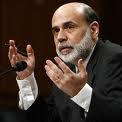 Anyone find these economic stimulus packages put out by the government and the Federal Reserve ridiculous at this point? The reality is a direct jobs program would be much cheaper and much more effective to get the economy moving. Yet, magically that idea has been dismissed and worse since 2008.
Anyone find these economic stimulus packages put out by the government and the Federal Reserve ridiculous at this point? The reality is a direct jobs program would be much cheaper and much more effective to get the economy moving. Yet, magically that idea has been dismissed and worse since 2008.
Fire in the Jackson Hole - Bombastic Stimulus Claims
Federal Reserve Chair Ben Bernanke will do more quantitative easing. That's the consensus from his Jackson Hole speech. As usual, the utterances on labor are ignored by Wall Street or in this case, used to justify Wall Street's crack addict quantitative easing fix.
The stagnation of the labor market in particular is a grave concern not only because of the enormous suffering and waste of human talent it entails, but also because persistently high levels of unemployment will wreak structural damage on our economy that could last for many years.
Taking due account of the uncertainties and limits of its policy tools, the Federal Reserve will provide additional policy accommodation as needed to promote a stronger economic recovery and sustained improvement in labor market conditions in a context of price stability.
Bernanke is justifying this action through various studies claiming quantitative easing generated jobs.
Recent comments